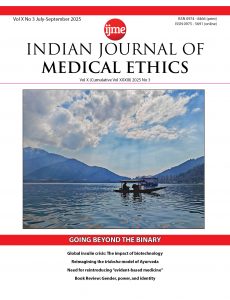
A joint editorial by science journal editors calls on health professionals of nuclear-armed states to pressurise their governments to end the nuclear arms programme and eliminate their nuclear weapons through a time-bound agreement. This is urgent as we exist in the shadow of unrestrained climate disasters and genocidal wars.
Yet the day-to-day challenges also demand attention. For example, social norms around sex and gender shape the classification of medical data. An editorial highlights the resultant ethical challenges and suggests improvements in recording sex and gender data in clinical settings, while a book review explores how the medical approach to gender is shaped by cultural and social influences.
In an era of randomised controlled trials (RCTs), can case studies from doctors help identify adverse effects of prescription drugs? A commentary explores the difference between evidence-based medicine and “evident-based medicine”. Another commentary raises concerns about a cluster RCT on the effectiveness of clinical breast examination for breast cancer, to which the trial’s researchers provide a detailed rebuttal.
Workers’ health is a grossly neglected issue in India, and silicosis is no exception. A commentary and its response highlight negligence in reporting, diagnosis, and social security support, and call for a shift of focus from compensation to prevention of this disease.
This issue covers a range of ethical concerns, including poems on survival and the impunity of violence, power imbalances confronting student researchers, and more.
__________________________________________________________________________________________________________Cover credit: The stillness of the Dal Lake, Kashmir, courtesy Sayantan Datta
